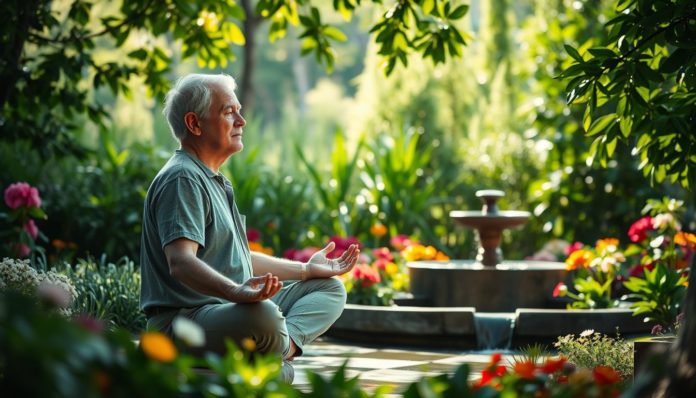Did you know that up to 90% of men with prostate cancer feel very tired? This fatigue is not like normal tiredness. A good sleep does not fix it. It’s important to handle this fatigue well. It can greatly affect how you manage daily life. This tiredness often comes from cancer or its treatment. So, finding ways to ease this fatigue is key during recovery.
Learning how to deal with this fatigue is the first step. It helps you take control of your energy. You can be undergoing treatment or in recovery. Either way, there are good strategies out there. They can help you handle your tiredness and keep up with your day.
Understanding Prostate Cancer Fatigue
Prostate cancer fatigue is not just being tired. It’s a deep, relentless tiredness that rest doesn’t help. It can last a short time or be long-term, seriously affecting everyday life. Learning and applying tips for managing prostate cancer fatigue and making necessary lifestyle changes for prostate cancer fatigue are key.

Differences Between Fatigue and Normal Tiredness
Ordinary tiredness comes after we work hard physically or mentally. It usually gets better with rest. But prostate cancer fatigue doesn’t work that way. It can hit without any clear reason and doesn’t go away with sleep. This total exhaustion impacts your body and mind. It’s important to know this to manage the fatigue right.
Common Causes of Cancer-Related Fatigue
Several things can cause prostate cancer fatigue. The cancer battles with healthy cells for nutrients, leaving you drained. Treatments like chemo and radiation are known for causing deep tiredness. Then there’s poor diet, certain meds, stress, sadness, and pain making it worse. Figuring out the cause is a step toward using lifestyle changes for prostate cancer fatigue to get better.
| Cause | Description | Impact on Fatigue |
|---|---|---|
| Cancer Itself | Competes for nutrients with normal cells. | Depletes energy reserves. |
| Chemotherapy | Destroys rapidly dividing cells, affecting normal cells as well. | Causes significant fatigue. |
| Radiation Therapy | Uses high-energy particles to destroy cancer cells. | Leads to an energy deficit. |
| Medications | Includes drugs for treatment and managing side effects. | Can contribute to overall tiredness. |
| Nutrition | Decreased appetite and nutrient absorption. | Reduces energy levels. |
| Stress and Depression | Psychological factors adding to physical strain. | Intensifies the feeling of fatigue. |
The Impact of Cancer Treatments on Fatigue
For those facing prostate cancer, understanding treatment-related fatigue is key. Treatments like chemotherapy and radiation vary in their impact. Patient experiences with treatment differ significantly.

Chemotherapy and Its Side Effects
Chemotherapy is known for tough side effects, including fatigue. The level of fatigue varies widely among patients. It can last even after treatment ends. This highlights the need for effective fatigue management during and post-chemotherapy.
Radiation Therapy and Fatigue
Radiation therapy for prostate cancer often leads to growing fatigue. This tiredness increases over time and can last weeks or a year after treatment. It’s vital to find ways to lessen this type of fatigue.
Combination Therapy and Increased Fatigue
Using chemotherapy and radiation therapy together, known as combination therapy, usually causes more fatigue. This increased tiredness makes everyday tasks difficult. It stresses the need for good prostate cancer fatigue treatments.
Symptoms of Prostate Cancer Fatigue
Prostate cancer fatigue impacts both body and mind deeply. Knowing the symptoms helps to manage and improve life quality.
Physical Symptoms
Physical symptoms can change daily life dramatically. Common signs include energy loss, weak legs, tiredness throughout the body, and feeling weak. This makes simple tasks very hard for individuals dealing with prostate cancer fatigue.
Mental and Emotional Symptoms
Prostate cancer fatigue affects mental and emotional states too. It can cause trouble concentrating, a general feeling of discomfort, and less motivation. Also, irritability, anxiety, and depression are common. These impact alertness significantly. Managing these symptoms is key to coping with prostate cancer fatigue.
Managing Prostate Cancer Fatigue
Dealing with prostate cancer fatigue takes a well-rounded approach. It’s important to combine medical treatments with personal care methods. This combo can bring a lot of improvement and comfort.
Medical Treatments
Medical steps are key in tackling prostate cancer fatigue. By treating root problems like anemia, you can feel a lot better. It’s crucial to work with your doctor to find the right treatment plan for you.
Self-Care Techniques
Self-care plays a huge part in fighting prostate cancer fatigue. Here are some strategies:
- Energy Conservation: Choose your activities wisely to avoid getting too tired. Focus on what’s really important and keep your energy for those tasks.
- Activity Pacing: Split tasks into smaller parts and take breaks often. This keeps your energy stable all day without getting too tired.
- Organize and Plan: Using planners or apps to schedule your day can help a lot. It makes managing fatigue easier with a good plan.
- Environmental Adjustments: Make where you live and work comfortable. Even small changes like better chairs can make a big difference in how tired you feel.
Making these changes in your life can help you manage your energy better. It can improve your daily life a lot.
Here’s a table comparing medical and self-care ways to handle prostate cancer fatigue:
| Treatment Type | Approach | Benefits |
|---|---|---|
| Medical Treatments | Treats underlying medical conditions | Targeted relief, professional oversight |
| Self-Care Techniques | Energy conservation, activity pacing | Personalized management, improved daily function |
Practical Tips for Coping with Fatigue
Dealing with prostate cancer fatigue can be tough. Yet, there are practical steps that can help. They conserve energy and promote a balanced lifestyle. Here are some tips to manage prostate cancer fatigue.
Energy Conservation Strategies
Effective energy saving is key when facing prostate cancer fatigue. Plan your day in advance to use your energy better. Try to pass tasks to others when you can. It helps to combine tasks to move less and remember to rest often to avoid getting too tired.
Activity Pacing and Scheduling
It’s important to keep a steady pace to prevent burnout. Don’t rush; keep a moderate speed and avoid overdoing it. Make sure to mix up sitting and standing tasks to help fight fatigue. Schedule your tasks wisely. Know when you have the most energy and plan your day around that. It really makes a difference.
- Plan and prioritize tasks
- Delegate when possible
- Combine activities to limit movement
- Take regular, short rests
- Adopt a moderate activity pace
- Balance sitting and standing
- Recognize personal energy patterns
- Adjust activities based on energy levels
Using these methods can help you cope with prostate cancer fatigue. They can make each day more lively and balanced. These strategies might not remove fatigue entirely but they can lighten the load and better your life.
Importance of Proper Nutrition
Eating well is key to handling cancer-related fatigue. To help with prostate cancer, focus on diet changes that increase energy. Visit nutritional support for prostate cancer for more tips.
Nutritional Tips to Combat Fatigue
Here are tips to fight prostate cancer fatigue:
- Eat various fruits and veggies for essential vitamins.
- Add lean proteins like chicken and fish for health.
- Drink lots of water to stay hydrated.
- Try B vitamins in supplements to boost energy.
Foods to Avoid
Some foods make fatigue worse. Try to avoid them. These include:
| Food Category | Reason to Avoid |
|---|---|
| High Sugar Foods | They cause energy drops, making fatigue worse. |
| Processed Foods | Low in nutrition, high in bad fats. |
| Alcohol | It can mess with your sleep and worsen fatigue. |
Using these diet tips helps you manage well-being and fight prostate cancer fatigue. For more help, check out this helpful resource on diet and activity.
Exercise and Physical Activity
Making exercise part of daily life can greatly help prostate cancer patients. It’s important to understand the benefits of regular exercise. Also, finding the right type of exercise for each person is key.
Benefits of Regular Exercise
Regular exercise helps prostate cancer patients feel better overall. A mix of moderate and vigorous activities can lower the chance of advanced cancer. These activities also help patients live longer. Plus, they help fight fatigue by increasing energy.
Exercises can make bones stronger and lessen anxiety. They can even improve control over urinary and sexual functions through exercises like Kegels. Regular exercise also leads to better sleep and helps in handling stress. It keeps muscles strong too. For more on how exercise helps prostate cancer patients, visit this resource.
Choosing the Right Exercise Regimen
Choosing the right exercise plan needs thought on the patient’s fitness and health. A mix of regular activities like walking, swimming, or biking works well. These should match the person’s health.
Talking to health experts can guide what exercises are best. This ensures the exercises are safe and helpful. Keeping up with doctors is vital to adjust the plan as needed.
In sum, creating a custom exercise program for prostate cancer patients is important. Such routines are not just good for physical health. They also greatly improve recovery and life quality.
Psychological Support for Fatigue Management
Prostate cancer patients often deal with fatigue from the disease and treatment. Mental and emotional health is very important during this time. Getting psychological support can really help with the stress, depression, or anxiety they may feel.
Help from psychologists or counselors is vital. They give valuable advice on coping with these issues. This can make stress and anxiety less severe, helping with fatigue. Being part of support groups is also helpful because it allows sharing with others in similar situations.
Adding mindfulness practices like meditation can improve patients’ well-being. Deep breathing and yoga reduce stress and help patients feel emotionally stronger. Using these resources helps in dealing with prostate cancer’s emotional side.
FAQ
What are the common causes of prostate cancer fatigue?
Prostate cancer fatigue can come from the cancer, treatments, and other factors. Treatments like chemotherapy and radiation, along with poor nutrition, can cause fatigue. Medications, pain, stress, activity level, and depression also play a part. Tumor cells competing for nutrients can make the fatigue worse.
How does prostate cancer fatigue differ from regular tiredness?
Prostate cancer fatigue is more severe than normal tiredness. It doesn’t go away with sleep and can hit suddenly. This fatigue can last even after treatment and really affect daily life.
What are the physical symptoms of prostate cancer fatigue?
The physical signs include feeling very low on energy, having tired legs, and feeling weak all over.
What mental and emotional symptoms are associated with prostate cancer fatigue?
On the mental and emotional side, one might struggle to concentrate and feel unmotivated. It also includes feeling irritable, anxious, and depressed.
How can chemotherapy contribute to fatigue in prostate cancer patients?
Chemotherapy can lead to fatigue that varies from person to person. This fatigue can continue even after the treatment is over. It happens because of how the body reacts to the drugs.
How does radiation therapy impact fatigue levels?
Radiation therapy can make fatigue worse over time. This tiredness can stick around for weeks to a year after finishing treatment.
What self-care techniques can help manage prostate cancer fatigue?
Managing fatigue includes planning your tasks and taking breaks. It’s important to pace yourself and use proper body mechanics. Also, watch the environment you’re in and eat well.
What strategies can help conserve energy for those coping with prostate cancer fatigue?
To save energy, plan ahead and ask others for help with tasks. Try to do things in easy steps and rest often. Keeping a balanced pace between activities and rest helps too.
How important is nutrition in managing prostate cancer fatigue?
Eating right is crucial in dealing with fatigue. Focus on balanced meals and maybe more B vitamins. Avoid foods that upset your stomach or don’t give you enough energy.
What are the benefits of regular exercise in alleviating cancer-related fatigue?
Regular exercise helps increase energy, improve sleep, manage stress, and keep muscles strong. Walking, swimming, or cycling at a moderate pace are good options, depending on your health.
How can psychological support aid in managing the emotional aspects of prostate cancer fatigue?
Psychological support helps with stress, depression, and anxiety linked to fatigue. Mental health professionals and mindfulness practices can greatly help with these emotional challenges.


